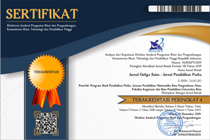ANALYSIS UNDERSTANDING OF CONCEPT IN SOUND WAVE MATERIALS AND LIGHT WAVES IN CLASS XI SENIOR HIGH SCHOOL STUDENTS TAMPAN PEKANBARU
Abstract
The main purpose of this research was to know the level of understanding of students’ concepts in the sound wave and light waves material in class XI students of senior high school in the sub-district of Tampan, Pekanbaru. This research is survey research. The population in this research were all students of class XI of state Senior high schools in the Tampan sub-district of Pekanbaru, while the research sample numbered 65 students. The research instrument was in the form of concept understanding tests that were compiled based on indicators understanding the concepts of translation, interpretation, and extrapolation. The questions used were in the form of a written test in the form of multiple-choice totaling 26 items. The results of the answers to the questions given are then analyzed using descriptive analysis. The results of this research provide information, that the level of concepts understanding of class XI students in high schools throughout the sub-district of Tampan, Pekanbaru in physics lessons on sound wave material and light waves are in the very low category for the three indicators of translation, interpretation, and extrapolation. Therefore, a learning strategy is needed that is able to overcome the low understanding of the student's concepts.
Keywords
Full Text:
PDFReferences
Anggereni, S. (2016). Efektivitas pembelajaran menggunakan media pembelajaran macro media flash dalam meningkatkan pemahaman konsep fisika materi hukum Newton, Jurusan Pendidikan Fisika Fakultas Tarbiyah dan Keguruan, UIN Alauddin Makassar. Jurnal Biotek, 4(2).
Astutik, S., Lesmono, A.D., & Adani, D.A.L. (2019). Pengaruh model collaborative creativity (CC) terhadap kemampuan literasi sains dan hasil belajar fisika siswa di SMA. Jurnal Pembelajaran Fisika, 21(1), 9-22, Januari 2019.
Athaillah, Khaldun, I., & Mursal. (2017). Peningkatan pemahaman konsep siswa melalui laboratorium virtual pada materi listrik dinamis di SMA Negeri 1 Sukamakmur Aceh Besar. Jurnal Pendidikan Sains Indonesia, 05(01), 114-119.
Cavus, N., & Alhih, M.S. (2014). Learning management systems use in science education. Social and Behavioral Sciences, 2(1), 517-520.
Hermansyah, Gunawan, & Herayanti, L. (2015). Pengaruh penggunaan laboratori-um virtual terhadap penguasaan konsep dan kemampuan berpikir kreatif siswa pada materi getaran dan gelombang. Jurnal Pendidikan Fisika dan Teknologi, 1(2), April 2015. ISSN. 2407-6902,
Holme, T.A., Luxford, C.J., & Brandriet, A. (2015). Defining conceptual under-standing in general chemistry. Journal of Chemical Education, 92(9), 1477-1483.
Ikbal, M.S., Nurhayati, & Ahmad, Y. (2018). Pengaruh metode guided inquiry dan pengetahuan operasi dasar matematika dalam praktikum fisika dasar terhadap pemahaman konsep fisika mahasiswa Pendidikan Fisika UIN Alauddin Makassar. Jurnal Al-Ta’dib, 11(1).
Kusdiastuti, M., Harjono, A., Sahidu, H., & Gunawan. (2016). Pengaruh model pembelajaran inkuiri berbantuan laboratorium. Jurnal Pendidikan Fisika dan Teknologi, 2(3), Juli 2016. ISSN. 2407-6902.
Lubis, I.L. (2009). Tingkatan pemahaman mahasiswa pada konsep fisika. Media Infotama, 4(8), 14-22.
Mutveia, A. & Mattssonb, J.E. (2014). Big ideas in science education in teacher training program. IOSTE BORNEO 2014. Procedia - Social and Behavioral Sciences, 167, pp. 190-197.
Nur, M. (2011). Model pembelajaran berdasarkan masalah. Surabaya: Pusat Sains dan Matematika Sekolah UNESA.
Nurhasanah, S., & Sobandi, A. (2016). Minat belajar sebagai determinan hasil belajar siswa. Jurnal Pendidikan Manajemen Perkantoran, 1(1), 135 - 142.
Putrayasa, I.M., Syahruddin, & Margunayasa, I.G. (2014). Pengaruh model pem-belajaran discovery learning dan minat belajar terhadap hasil belajar IPA siswa. Jurnal Mimbar PGSD Universitas Pendidikan Ganesha, 2(1).
Sardinah, Tursinawati, & Noviyanti, A. (2012). Relevansi sikap ilmiah siswa dengan konsep hakikat sains dalam pelaksanaan percobaan pada pem-belajaran IPA di SDN Kota Banda Aceh. Jurnal Pendidikan Serambi Ilmu, 13(2). Edisi September 2012,
Saregar, A. (2016). Pembelajaran pengantar fisika kuantum dengan memanfaatkan media PhET simulation dan LKM melalui pendekatan saintifik: Dampak pada minat dan penguasaan konsep Mmahasiswa. Jurnal Ilmiah Pendidikan Fisika Al-Biruni, 5(1), 53–60. https://doi.org/ 10.24042/jpifalbiruni.v5i1.105.
Trianggono, M.M. (2017). Analisis kausalitas pemahaman konsep dengan kemampuan berpikir kreatif siswa pada pemecahan masalah fisika. Jurnal Pendidikan Fisika dan Keilmuan (JPFK), 3(1), 1-12.
Widya Oktaviani, Gunawan, dan Sutrio. 2017. Pengembangan bahan ajar fisika kontekstual untuk meningkatkan penguasaan konsep siswa. Jurnal Pendidikan Fisika dan Teknologi, ISSN. 2407-6902, 3(1), Juni 2017.
Yanti, Y., Masril, Hidayati, & Yenni Darvina, Y. (2019). Pengaruh penerapan lks virtual laboratory dalam pembelajaran konstruk-tivisme terhadap pencapaian kompetensi fisika siswa kelas XI SMAN 15 Padang. Jurusan Fisika, FMIPA Universitas Negeri Padang. Pillar of Physics Education, 12(1), 153-160.
Yuliani, H., Mariati, Yulianti, R., & Herianto, C. (2017). Keterampilan berfikir kreatif pada siswa sekolah menegah di Palangka Raya menggunakan pendekatan saintifik. Jurnal Pendidikan Fisika dan Keilmuan (JPFK), 3(1):48-56. ISSN 2442-8868.
DOI: http://dx.doi.org/10.31258/jgs.8.1.33-41
Refbacks
- There are currently no refbacks.
Copyright (c) 2020 Nindri Resti Nova, Fakhruddin Fakhruddin, Yennita Yennita

This work is licensed under a Creative Commons Attribution 4.0 International License.
Jurnal ini terdaftar dan terindeks pada:
- Crossref
- Google Scholar
- Crossref
- Garuda
- Sinta
- Researchgate
- Dimensions
- Base
- Scilit
- OneSearch
- Road
- CiteFactor
- ResearchBib
- WorldCat



















